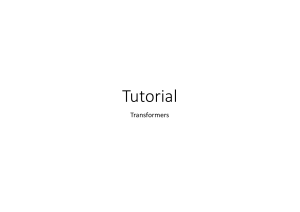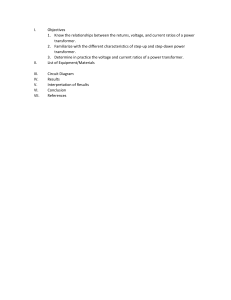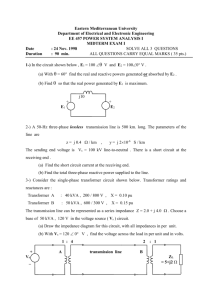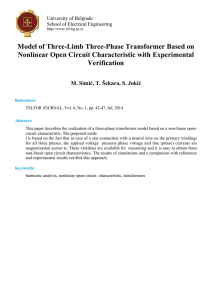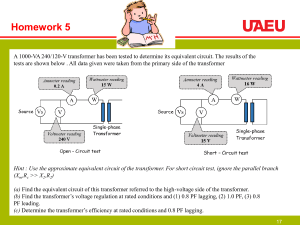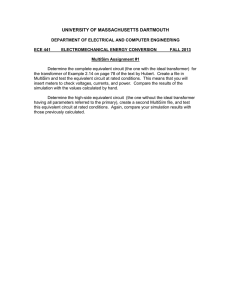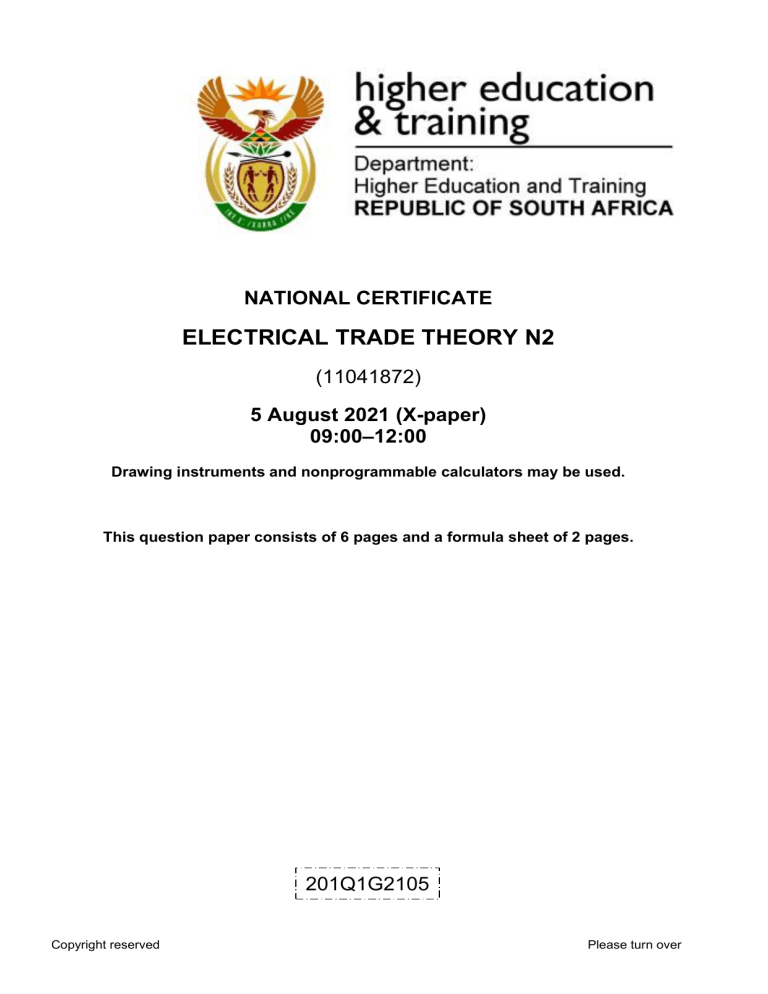
NATIONAL CERTIFICATE ELECTRICAL TRADE THEORY N2 (11041872) 5 August 2021 (X-paper) 09:00–12:00 Drawing instruments and nonprogrammable calculators may be used. This question paper consists of 6 pages and a formula sheet of 2 pages. 201Q1G2105 Copyright reserved Please turn over (11041872) -2- DEPARTMENT OF HIGHER EDUCATION AND TRAINING REPUBLIC OF SOUTH AFRICA NATIONAL CERTIFICATE ELECTRICAL TRADE THEORY N2 TIME: 3 HOURS MARKS: 100 INSTRUCTIONS AND INFORMATION 1. Answer all the questions. 2. Read all the questions carefully. 3. Number the answers according to the numbering system used in this question paper. 4. Where applicable, answers must be in accordance with the SABS (SANS) Code of Practice SANS 10142-1:2003 for the Wiring of Premises. 5. Sketches must be neat, labelled and large enough to show the required detail. 6. Answers must be rounded to THREE decimals. 7. No mark will be allocated for incorrect SI units. 8. Work neatly. Copyright reserved Please turn over (11041872) -3- QUESTION 1: ALTERNATING-CURRENT THEORY 1.1 1.2 Define the following terms: ⭓ 1.1.1 RMS value 1.1.2 Instantaneous value (2 × 2) (4) (4 × 2) (8) [12] A waveform is represented by the equation e = 200 sin 314,28 t. Calculate each of the following: 1.2.1 RMS value 1.2.2 Average value 1.2.3 Frequency 1.2.4 Form factor ⭓ QUESTION 2: CONDUCTO RS, INSULATORS AND CABLES 2.1 2.2 2.3 Indicate whether the following statements are TRUE or FALSE by writing only 'True' or 'False' next to the question number (2.1.1–2.1.3) in the ANSWER BOOK. 2.1.1 Armouring is used to provide mechanical protection for the cable and also to serve as an earth continuity conductor. 2.1.2 Copper is the most commonly used insulator in the electrical industry. 2.1.3 It is allowable for cables to carry current above the maximum rating for long periods of time (3 × 1) ⭓ (3) State the use of each of the following insulating materials: 2.2.1 Mica 2.2.2 Bakelite 2.2.3 Porcelain ⭓ (3 × 1) Draw a neat, labelled diagram of a PILCSWA cable. Copyright reserved (3) (6) [12] Please turn over (11041872) -4- QUESTION 3: SWITCHGEAR AND PROTECTIVE DEVICES 3.1 What is the difference between a disconnector and switch disconnector? 3.2 Name ONE protective device that can be used to protect the circuit against each the following fault conditions: (2) ⭓ 3.2.1 Overload 3.2.2 Earth-fault current 3.2.3 Voltage surge (3 × 1) 3.3 Which part of a relay is connected to the control circuit? 3.4 Briefly explain the following circuit-breaker ratings: 3.4.1 Overload rating 3.4.2 Short-circuit rating (3) (1) ⭓ (2 × 2) (4) [10] QUESTION 4: BATTERIES 4.1 List FIVE factors influencing the capacity of lead/acid batteries. (5) 4.2 Name TWO applications of gel batteries. (2) 4.3 Briefly describe each of the following components of lithium/ion batteries: 4.3.1 Cathode 4.3.2 Anode 4.3.3 Electrolyte ⭓ ⭓ (3 × 1) Copyright reserved Please turn over (3) [10] (11041872) -5- QUESTION 5: DC MACHINES 5.1 State what is meant by armature reaction. (2) 5.2 Name TWO methods that can be used to improve commutation. 5.3 Draw TWO circuit diagrams to show how a change in direction of rotation of a series motor is achieved. The first diagram must represent forward rotation and the second the reverse rotation. Indicate the supply polarity as well as the current flow in both circuits. (2 × 3) ⭓ (2) (6) [10] QUESTION 6: AC MACHINES 6.1 Give TWO advantages of three-phase motors compared to single-phase motors. (2) 6.2 Explain the construction of a squirrel-cage rotor. (3) 6.3 Draw a circuit diagram of a capacitor-start induction-run AC motor. ⭓ (3) [8] QUESTION 7: TRANSFORMERS 7.1 A three-phase transformer has a delta-connected primary and a star-connected secondary. The transformer is connected to a 1,1-kV supply. The secondary phase voltage is 220 V. ⭓ Calculate each of the following: 7.1.1 Secondary line voltage (1) 7.1.2 Primary phase current when transformer draws a full-load current of 120A from the supply (2) Transformer rating in kVA (2) 7.1.3 ⭓ 7.2 State the function of a transformer. 7.3 State THREE common three-phase transformers configurations. Copyright reserved (2) (3) [10] Please turn over (11041872) -6- QUESTION 8: EARTHING 8.1 8.2 State FOUR measures to protect people, animals and property from harmful earth-fault currents. ⭓ Give the main function of each of the following: 8.2.1 Earth-tag washer 8.2.2 Cable gland (2 × 2) 8.3 (4) Define touch voltage. (2) [10] QUESTION 9: MEASURING INSTRUMENTS ⭓ 9.1 Name THREE disadvantages of digital measuring instruments. 9.2 Choose an item from COLUMN B that matches a description in COLUMN A. Write only the letter (A–D) next to the question number (9.2.1–9.2.3) in the ANSWER BOOK. 9.2.1 9.2.2 9.2.3 (4) COLUMN A Measures highest average value of power during certain time interval Determines ratio of true power to apparent power of an alternatingcurrent circuit ⭓ Measures total energy used during a certain time interval A (3) COLUMN B power-factor meter B maximum demand meter C watt-hour meter D frequency meter (3 × 1) (3) [6] QUESTION 10: RENEWABLE ENERGY AND RETICULATION 10.1 Name FOUR types of nonrenewable energy sources. (4) 10.2 Name FOUR types of power stations. (4) 10.3 Define electrical reticulation network. 10.4 Why is there no neutral conductor in a high-voltage transmission line? ⭓ (2) (2) [12] TOTAL: Copyright reserved 100 (11041872) -1- ELECTRICAL TRADE THEORY N2 FORMULA SHEET Any other applicable formula may also be used. AC THEORY 𝑒 = 𝐵𝑙𝑣 𝑒 = 𝑒𝑚𝑎𝑥 sin 𝜃 𝑖 = 𝑖𝑚𝑎𝑥 sin 𝜃 𝑇= 1 𝑓 𝐸𝑎𝑣𝑒 = 0,637𝐸𝑚𝑎𝑥 𝐸𝑟𝑚𝑠 = 0,707𝐸𝑚𝑎𝑥 𝑓𝑜𝑟𝑚 𝑓𝑎𝑐𝑡𝑜𝑟 = 𝐶𝑟𝑒𝑠𝑡 𝑓𝑎𝑐𝑜𝑟 = 𝑅𝑀𝑆 𝑣𝑎𝑙𝑢𝑒 𝐴𝑣𝑒𝑟𝑎𝑔𝑒 𝑣𝑎𝑙𝑢𝑒 𝑀𝑎𝑥 𝑉𝑎𝑙𝑢𝑒 𝑅𝑀𝑆 𝑉𝑎𝑙𝑢𝑒 𝑋𝐿 = 2𝜋𝑓𝐿 𝑋𝑐 = 1 2𝜋𝑓𝐶 𝑍 = √𝑅 2 + (𝑋𝐿 − 𝑋𝐶 )2 𝐼= 𝑉 𝑍 cos 𝜃 = STAR 𝑅 𝑍 VL = 3 VPH I L = I PH DELTA VL = VPH I L = 3 I PH TRANSFORMER Copyright reserved V1 N1 I 2 E1 = = = V2 N 2 I1 E2 Please turn over (11041872) -2- SINGLE-PHASE: Apparent power S = VI True power P = VI cosø Reactive power: Q = VI sinø THREE-PHASE: Apparent power: S = 3 VL I L True power: P = 3 VL I L cosø Reactive power: Q = 3 VL I L sinø Fault current: Ifc = Copyright reserved CIF A t
